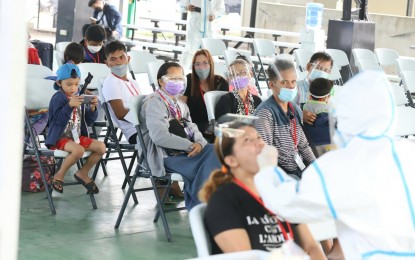
(File photo)
MANILA – The Quezon City government acquired 100,000 rapid antigen test kits to further control the spread of the coronavirus disease 2019 (Covid-19).
City Epidemiology and Disease Surveillance Unit (CESU) chief, Dr. Rolando Cruz, said Friday the local government is collaborating with the Philippine Red Cross while local officials and philanthropists conduct free rapid antigen testing in communities daily.
As of Wednesday, there are 17 community-based testing centers.
An antigen test for SARS-CoV-2 (Severe Acute Respiratory Syndrome Coronavirus 2) starts with the collection of a sample of mucus from the back of the throat or nose using a swab.
The swab is then dipped into a liquid to dissolve the mucus and release the virus.
“(The) CESU-initiated testing centers have been operating since last year and have been offering free testing to mostly symptomatic, close contacts, and persons needing hospitalization as part of the protocol. Each testing center is equipped with swab booths and can accommodate between 100 and 200 individuals per day,” he said in a statement.
The CESU is also implementing the Kyusi-Industriya I.W.A.S. (Industry-Wide Active Surveillance) sa Covid-19, which offers free routine swab tests to employees.
This month, the CESU is scheduled to test more than 1,500 employees from government agencies, such as the Office of the Ombudsman and Department of Social Welfare and Development, and private companies.
Mayor Joy Belmonte said strengthening the CESU’s capacity to test would allow the city government to detect cases faster, prevent the spread of the virus, and properly respond to those needing immediate medical attention or isolation.
As of Friday, the city has 25,770 active Covid-19 infections.
"Timely confirmation of the virus’ presence is essential, especially given the upsurge in cases. More than ever, we must think of our priority sectors, such as senior citizens and those with comorbidities, who rely on speedy test results in order to receive immediate and appropriate medical care,” Belmonte said in another statement. (PNA)
